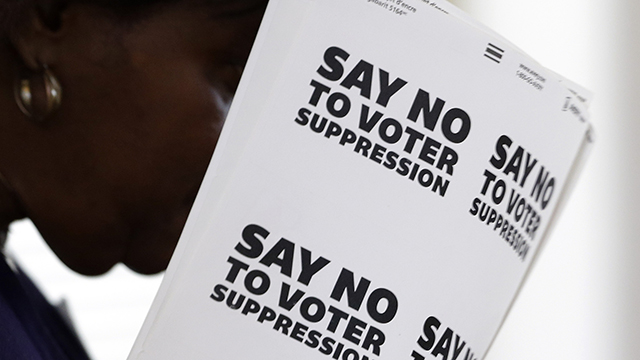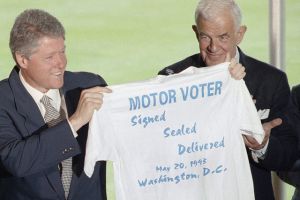This editorial first appeared at The Brennan Center for Justice blog.

A supporter of the North Carolina NAACP holds stickers for those gathered in the House chamber of the North Carolina General Assembly where lawmakers debated and voted on voter identification legislation in Raleigh, NC, Wednesday, April 24, 2013. (AP Photo/Gerry Broome)
Hillary Clinton launched her summer of policy speeches last month with a stirring call for voting rights, including overdue expansions of early voting and automatic voter registration. I happen to agree with everything she said. I’m just worried she’s the one saying it.
Bring back the boring. Add a dash of bland competence.
America needs less partisanship in voting. But in her kick-off policy speech, Clinton took the gloves off to fire up her base, taunting Republican presidential contenders by name for their attacks on voting rights: Rick Perry, Scott Walker, Jeb Bush, Chris Christie. They have “undercut [a] fundamental American principle.”
They counter attacked. “She just wants an opportunity to commit greater acts of voter fraud around the country,” New Jersey Gov. Christie barked. Her efforts “defy logic,” asserted Wisconsin’s Gov. Walker, adding that early voting and automatic voter registration represent “extreme views … far outside the mainstream.”
Election administration in the United States should not be polarized, fraught or risky.

It wasn’t always this way. In 1993, Congress enacted the National Voter Registration Act, to make it easier for Americans to register to vote and to maintain their registration.
In July Kansas Secretary of State Kris Kobach received unprecedented authority to bring criminal cases against alleged voter improprieties. No other such figure has such power. Kobach only secured the capabilities after local prosecutors – most of them Republicans not known for being soft on crime – declined to bring voter fraud incidents referred to them by Kobach.
Kobach is now trawling for criminal cases. Just call Kansas’s Stop Voter Fraud hotline, 800-262-8683.
Down in Georgia, Brian Kemp, the Republican in charge of overseeing the state’s election laws, let his partisan interests show in a speech just before the elections last fall, “Democrats are working hard … registering all these minority voters … If they can do that, they can win these elections in November.” So Kemp launched felony investigations into groups that enroll minority voters. One group faced criminal accusations because it failed to let people know that they could turn in their own voter registration forms.
Kobach and Kemp are empowered by a voting administration system that is structurally partisan. In 39 states, the top election official is directly affiliated with one of the political parties. The remaining 11 states and Washington, DC, have boards, some of which are partisan.
This has led to some unsavory conflicts of interest in the past: an Ohio Secretary of State overseeing the election system at the same time he was running for governor; a Florida chief election officer also serving on a presidential candidate’s campaign committee.
This June, officials in Florida’s Broward County — yes, that Broward County — learned that their elections administration lawyer had made campaign contributions to local candidates. The supervisor of elections does not have a conflicts policy. According to the agency head, it’s no problem if employees administer voting laws by day and work on campaigns by night.
If we look to the north, we would see an election system that tries to suck out the partisan poison. In Canada, a chief electoral officer is appointed for 10-year terms by the nation’s House of Commons. It’s not a perfect system, but much of the animosity and dysfunction present in the United States is notably absent in Canada.
One of the few efforts in the US to replicate Canada’s system, Wisconsin’s Government Accountability Board, is now under withering attack. The Board, created in 2008, consists of six members, all former judges with staggered terms. It has its flaws, but it is nevertheless a principled effort to diminish political control of voting.
In July, Wisconsin’s governor and Republican presidential candidate Scott Walker called for the Board’s abolition. The normally right-leaning Milwaukee Journal-Sentinel chastised Republicans for trying to make the system “more subservient to…partisan interests.”
The last thing we need is to inject more partisanship into voting. Let the Republican and Democratic parties define themselves and rally their bases. But not by hardening partisan positions on voting. It should not be a wedge issue.
The views expressed in this post are the author’s alone, and presented here to offer a variety of perspectives to our readers.


